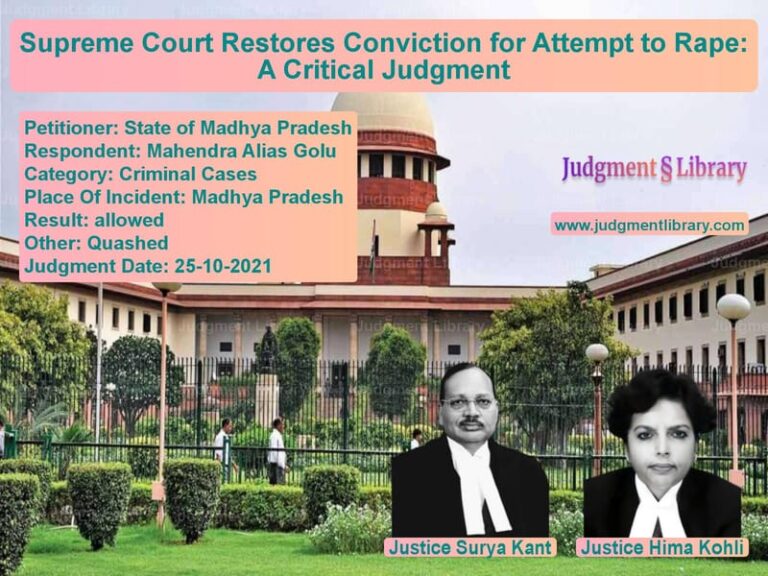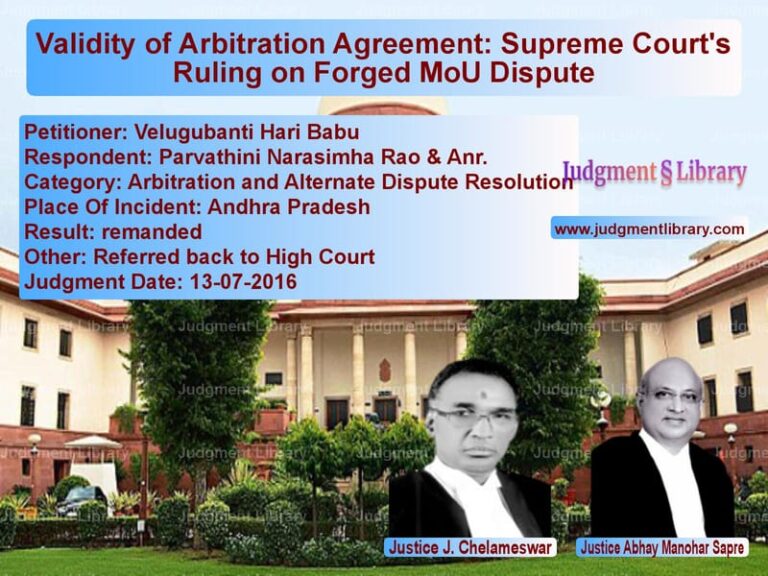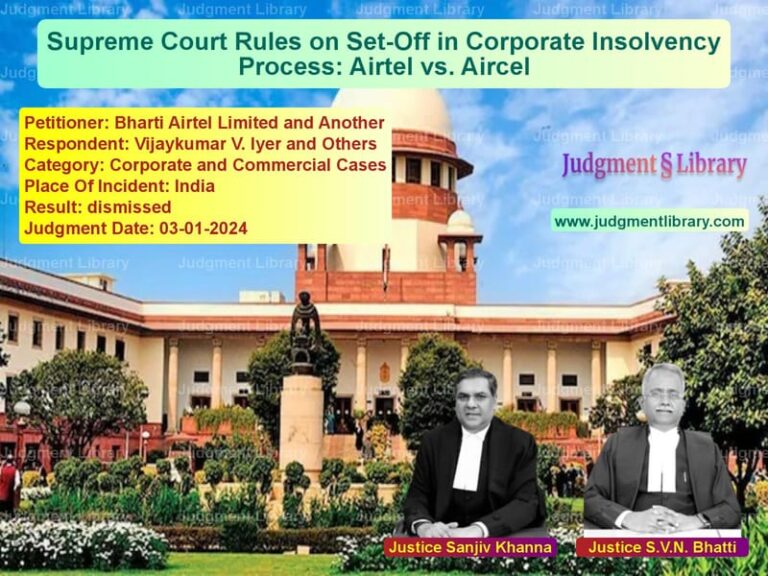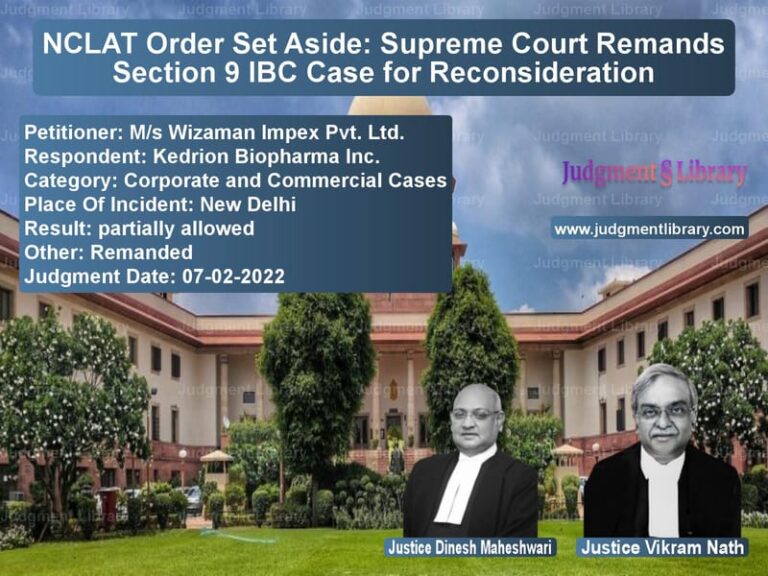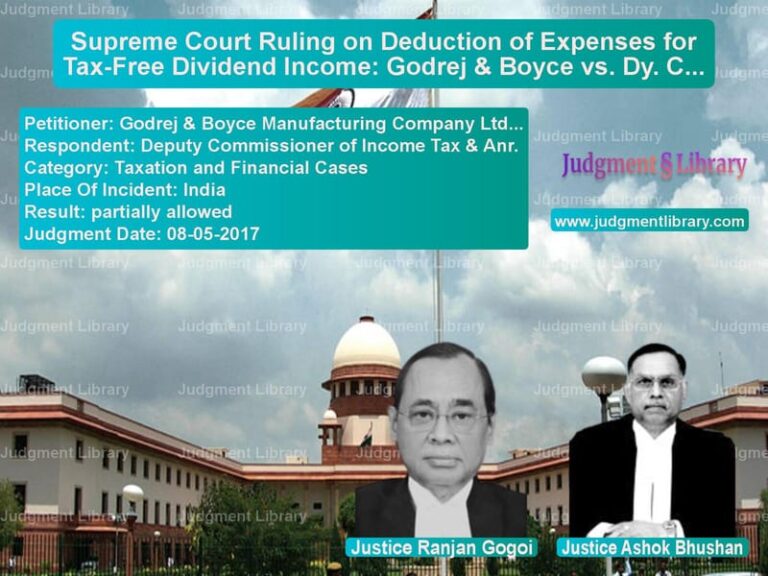Government of NCT of Delhi vs. Mohd. Zubair: Supreme Court Overrules Land Acquisition Lapse
The Supreme Court of India, in its judgment dated December 2, 2022, in the case of Government of NCT of Delhi vs. Mohd. Zubair & Another, overturned the Delhi High Court’s ruling that had declared land acquisition proceedings lapsed under Section 24(2) of the Right to Fair Compensation and Transparency in Land Acquisition, Rehabilitation, and Resettlement Act, 2013.
The Supreme Court ruled that a subsequent purchaser does not have the legal standing to challenge land acquisition proceedings and that mere non-payment of compensation does not lead to an automatic lapse of acquisition under Section 24(2) of the 2013 Act. The Court reaffirmed the interpretation laid down by the Constitution Bench in Indore Development Authority vs. Manoharlal.
Background of the Case
The dispute arose over land acquisition proceedings initiated under the Land Acquisition Act, 1894. The Government of NCT of Delhi had acquired the land for public purposes, and possession was taken on July 16, 2007. However, the respondent, a subsequent purchaser of the land, filed a writ petition in the Delhi High Court, claiming that the acquisition had lapsed due to non-payment of compensation.
The Delhi High Court ruled in favor of the respondent, declaring that the acquisition had lapsed under Section 24(2) of the 2013 Act. The Government of NCT of Delhi challenged this decision before the Supreme Court.
Arguments Presented
Petitioners’ (Government of NCT of Delhi) Arguments
The Government of NCT of Delhi, represented by its counsel, argued:
- The High Court erred in entertaining a challenge to land acquisition by a subsequent purchaser.
- Possession of the land was taken on July 16, 2007, well before the 2013 Act came into force.
- The Supreme Court had already ruled in Indore Development Authority that for acquisition to lapse, both conditions—failure to take possession and non-payment of compensation—must be met.
- Once possession has been taken, the land vests with the state, and the acquisition cannot lapse under Section 24(2) of the 2013 Act.
Respondents’ (Mohd. Zubair) Arguments
The respondents, represented by their counsel, countered with the following points:
- Compensation had not been paid to the landowners, and non-payment of compensation should result in the lapse of acquisition.
- The Delhi High Court had correctly relied on earlier Supreme Court rulings that emphasized the need for compensation to be paid directly to landowners.
- Since the original landowners had transferred the land, the subsequent purchaser had the right to challenge the acquisition.
Supreme Court’s Observations
The Supreme Court reviewed the legal and factual aspects of the case and observed:
- “A subsequent purchaser has no locus to challenge land acquisition proceedings. The High Court erred in entertaining the writ petition filed by the respondent.”
- “Possession of the land in question was taken on 16.07.2007, and once possession is taken, the land vests in the state. The acquisition, therefore, cannot lapse under Section 24(2) of the 2013 Act.”
- “The word ‘or’ in Section 24(2) must be read as ‘nor’ or as ‘and,’ meaning that if either possession has been taken or compensation has been paid, the acquisition does not lapse.”
- “In this case, since possession had been taken, the acquisition remains valid despite the alleged non-payment of compensation.”
Legal Interpretation of Section 24(2) of the 2013 Act
The Supreme Court, in Indore Development Authority, provided clarity on how Section 24(2) should be interpreted:
- The lapse of land acquisition proceedings requires both non-payment of compensation and failure to take possession.
- Depositing compensation in court is sufficient compliance with the legal requirement of payment.
- Landowners who refuse to accept compensation or seek higher compensation through legal proceedings cannot claim that acquisition has lapsed.
- Once possession is taken, land vests in the state, and acquisition cannot be reversed under Section 24(2).
Judgment and Ruling
The Supreme Court ruled in favor of the Government of NCT of Delhi and held:
- The Delhi High Court’s judgment was quashed and set aside.
- The land acquisition proceedings were upheld as valid and not deemed to have lapsed.
- The ruling in Indore Development Authority was reaffirmed as the authoritative interpretation of Section 24(2) of the 2013 Act.
Implications of the Judgment
This ruling has wide-ranging implications for land acquisition cases in India:
- The Supreme Court has reaffirmed that a subsequent purchaser cannot challenge land acquisition proceedings.
- Government authorities can rely on the clarity provided by the Court regarding Section 24(2) of the 2013 Act.
- Public infrastructure projects that were stalled due to legal challenges from subsequent purchasers may now proceed without unnecessary delays.
Conclusion
The Supreme Court’s decision in Government of NCT of Delhi vs. Mohd. Zubair & Another is a landmark ruling that reinforces the legal position on land acquisition proceedings. By upholding the acquisition and quashing the Delhi High Court’s ruling, the Court has ensured that landowners and subsequent purchasers do not unfairly benefit from procedural delays and that public projects can continue without legal hurdles. This judgment sets a crucial precedent for future land acquisition cases and provides clarity on the application of Section 24(2) of the 2013 Act.
Petitioner Name: Government of NCT of Delhi.Respondent Name: Mohd. Zubair & Another.Judgment By: Justice M.R. Shah, Justice C.T. Ravikumar.Place Of Incident: Delhi.Judgment Date: 02-12-2022.
Don’t miss out on the full details! Download the complete judgment in PDF format below and gain valuable insights instantly!
Download Judgment: government-of-nct-of-vs-mohd.-zubair-&-anoth-supreme-court-of-india-judgment-dated-02-12-2022.pdf
Directly Download Judgment: Directly download this Judgment
See all petitions in Property Disputes
See all petitions in Landlord-Tenant Disputes
See all petitions in Specific Performance
See all petitions in Judgment by Mukeshkumar Rasikbhai Shah
See all petitions in Judgment by C.T. Ravikumar
See all petitions in allowed
See all petitions in Quashed
See all petitions in supreme court of India judgments December 2022
See all petitions in 2022 judgments
See all posts in Civil Cases Category
See all allowed petitions in Civil Cases Category
See all Dismissed petitions in Civil Cases Category
See all partially allowed petitions in Civil Cases Category


